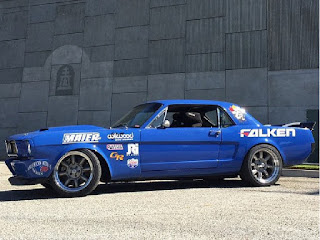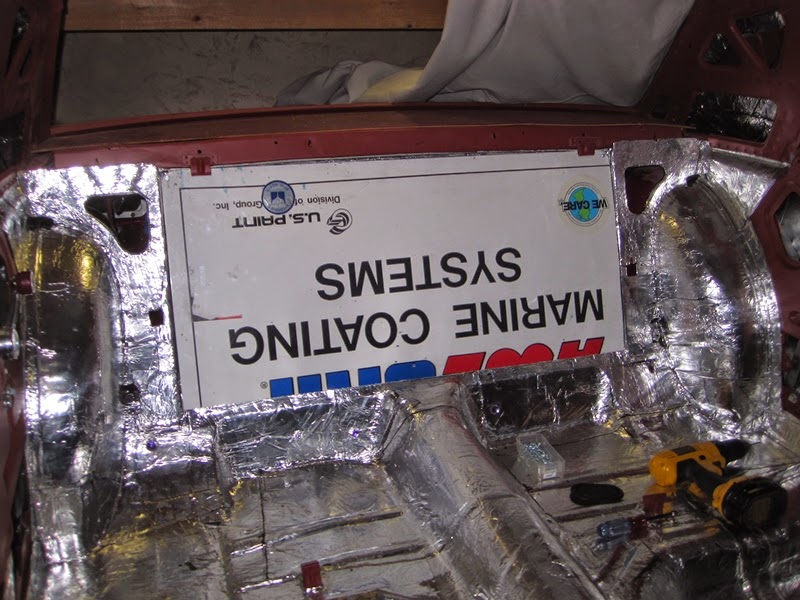Finally back to work in my new garage, and it feels great! In the last three garages, I've installed fluorescent lighting, but this time I wanted something more portable. I ended up with this LED
tripod light from Northern Tool. The tripod is on the flimsy side, but it's fine for what I need and I get more than enough photons wherever I want them. I can see myself using this light (or one like it) for a lot of future projects.
 |
| Perfect working conditions :) |
Right now I'm concentrating on getting the 68 running again as soon as possible - I want to take it to some
BAMA events before the car goes for paint - so I've skipped over a few things that I'll have to come back to later. One of those was the driveshaft, which I acquired used from my good friends at CP Designs. Normally I would have taken the time to paint it gray to match the rear differential housing, but I don't have anywhere I can use as a paint booth right now. Plus it's not exactly the most difficult part to remove later. The optimum length of the driveshaft with the T5/8 inch rear end is 52 ½ inches from the tail housing seal to the center of the u-joint at the pinion of the differential. I had to buy appropriate U-bolts because the originals were designed for the six cylinder rear end.



Around the time I installed my SSBC brake setup and new brake lines, I also installed the wider bore ⅜ fuel line I'll need for the V8. The only problem with this, apart from some of my amateurish bends, was that I directed the fuel line to the original location - or in other words, to where the fuel ump used to be when the car had a six cylinder engine. Oops! Rookie error! I'm not sure how long it would have taken me to figure this out if one of my friends hadn't noticed.
 |
| Six cylinder location at steering box |
I had to take the fender off to get at the incorrect fuel line, and while I was thinking about how to make a replacement piece, and whether my custom drilled mounting holes in the frame rail would still be usable, I found myself drifting off in a completely different direction.....
 |
| Looks nice, but still incorrect |
The steering box: back when the 68 was
actually running, the steering was as sloppy as a soup sandwich. On a hot day. I'd always planned on figuring out a rebuilt or replacement box closer to the end of the project, but for the purpose of moving the car around I had re-installed the original part. And so, as I was staring down at the misdirected fuel line, I realized the time had come to deal with the steering box - apart from anything else, it was in danger of becoming seriously inaccessible as the engine compartment filled up.
The options for a steering boil down to:
- Rebuilding the existing box
- Buying a rebuilt box from NPD and using the original as a core to obtain a discount
- Buying a after market steering box
- Upgrading to power steering
- Going for a full-on upgrade to electric power steering as some other folks in BAMA have done.
I pretty quickly came to the conclusion that a rebuild is best left to a specialist, and I'm not planning any power assists to start with, so it really comes down to either #2 or #3. After shopping around the various mustang parts houses I managed to find a
Flaming River aftermarket box for less that $500 from
Mustangs Unlimited, including free shipping. This is about $50 more than it would cost to buy a rebuilt box from
NPD and pay to ship them the core. The flaming river steering box is on the left in the picture below. I decided not to paint it gray like I did the original.
 |
| Here is is in situ |
After the steering box was installed, I moved on the the instrument cluster which I
wrote about a couple of weeks ago. I had to loose the heater control panel and add the dash pad before the cluster could be eased into place. I'm really happy with the (very slightly) customized look.
Next I popped in the chrome-plated export brace that I picked up on a visit to
Turlock in 2011 and have been storing in various attic spaces for the last four years. I say "popped in" but in truth it was quite a fight. For a start, installation necessitated removal of the shocks and for another it did not line up exactly right - although it was a lot nearer now the engine is back in place. I basically forced it into position by getting some of the bolts started and pulling the chassis into alignment as the bolts were cranked down. Another job done!








































